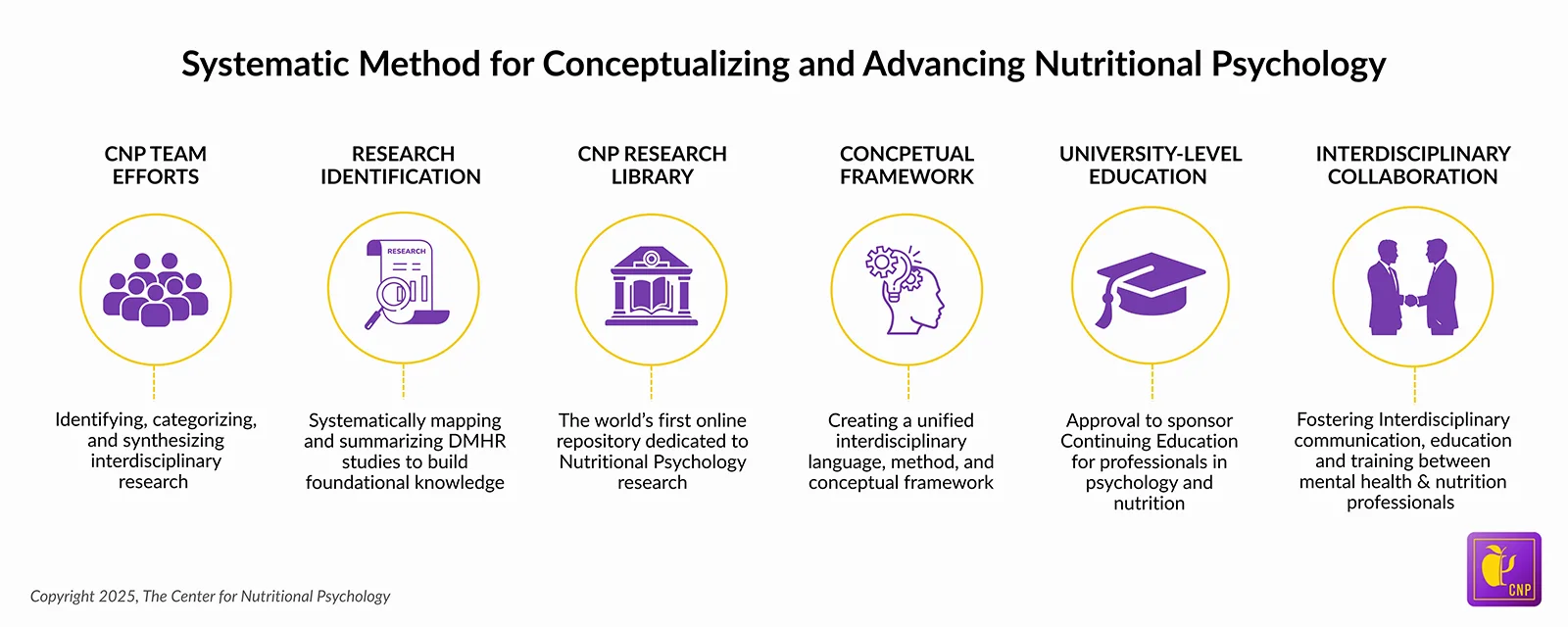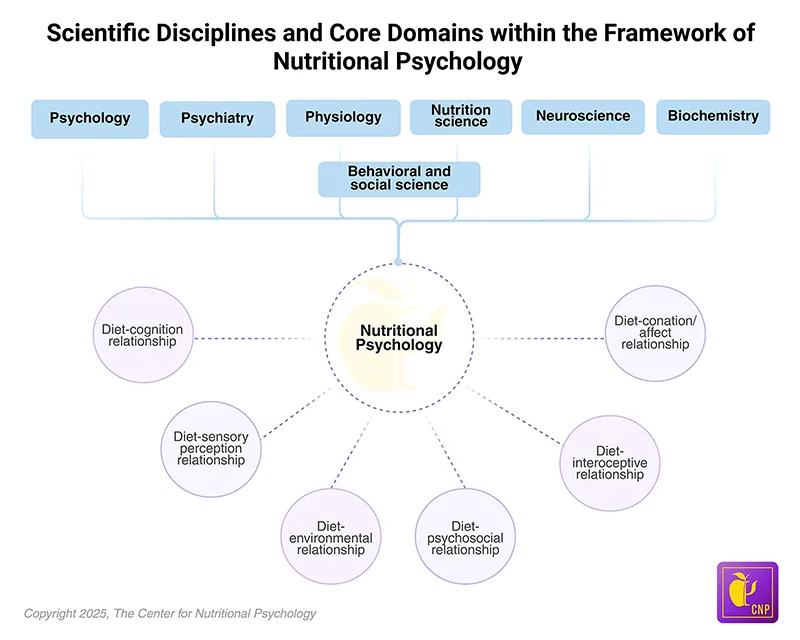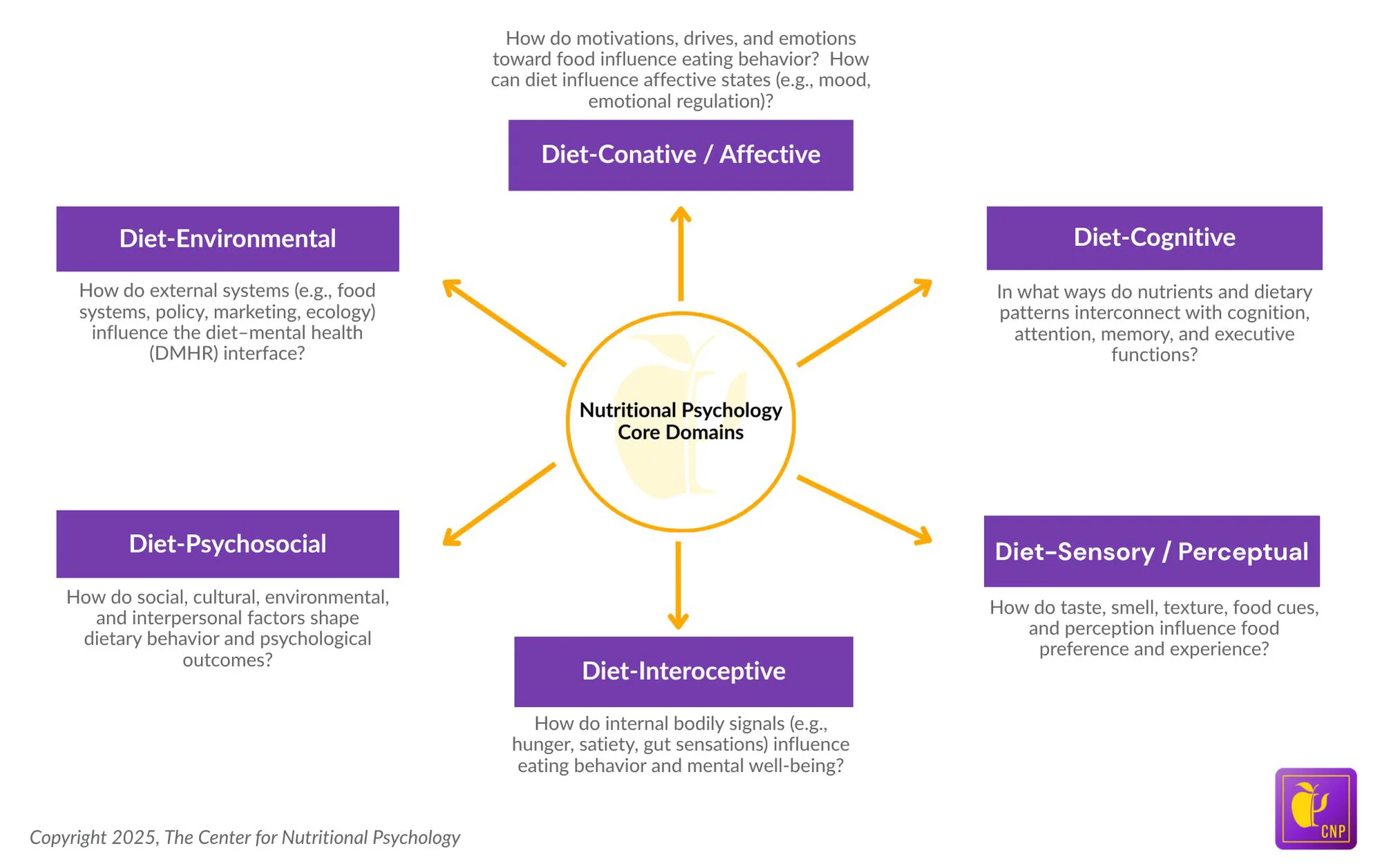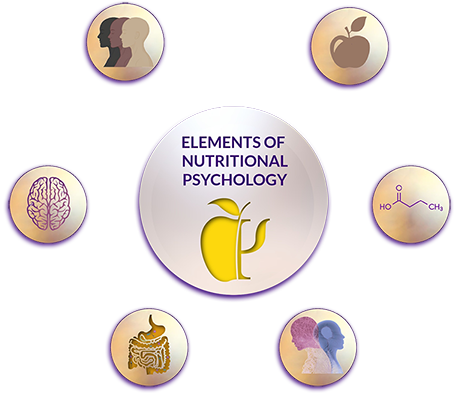 Nutritional Psychology (NP) is an emerging interdisciplinary field exploring the intricate, bidirectional relationships between nutrition and psychology. Situated at the intersection between the nutritional and psychological sciences, NP examines how what we eat influences how we think, feel, and experience life through the complex biological, psychological, social, and environmental pathways enabled by our dietary intake patterns.
Nutritional Psychology (NP) is an emerging interdisciplinary field exploring the intricate, bidirectional relationships between nutrition and psychology. Situated at the intersection between the nutritional and psychological sciences, NP examines how what we eat influences how we think, feel, and experience life through the complex biological, psychological, social, and environmental pathways enabled by our dietary intake patterns.
The Conceptual Framework of Nutritional Psychology — the first evidence-based theoretical model defining and structuring this discipline—was developed by the Center for Nutritional Psychology research team and published in Behavioral Sciences (Stroebele-Benschop et al., 2025). This framework establishes NP’s theoretical foundations, structure, and six-domain categorization that together guides ongoing research, education, and application in this domain (read the full article).
As this emerging field gains recognition, professionals across disciplines are beginning to identify gaps in their own education. Psychologists and mental health professionals increasingly recognize the bidirectional relationship between diet and mental health; yet, most report limited formal training in nutrition and a strong desire for further education in this area. Similarly, nutritionists and dietitians often lack formal grounding in the psychosocial and cognitive dimensions of mental-health practice, limiting their ability to fully engage in the emerging NP domain (Kiskinis, Lu, & Gurrieri, 2025).
Systematic Method for Conceptualizing and Advancing the Field
Efforts to formalize the evidence-based theoretical framework connecting nutrition and psychology have evolved over the past two decades (Benschop et al., 2025; Gómez-Pinilla, 2008). Since 2015, CNP has systematically identified, reviewed, categorized, and synthesized thousands of studies bridging these disciplines, culminating in the development of the Conceptual Framework for Nutritional Psychology—a model that unifies this growing body of research into a coherent structure.
What kinds of questions are explored in Nutritional Psychology?

Core Domains within the NP Framework
Through this work, CNP has developed the first evidence-based theoretical foundation conceptualizing the field of Nutritional Psychology. This framework organizes research across multiple scientific disciplines into six interconnected core domains that together inform ongoing research, education, and the integration of nutrition into mental healthcare (Stroebele-Benschop et al., 2025).
CNP’s framework provides a clear, structured, and unified vision of the nutrition–mental health relationship —guiding research, education, and the practical application of NP.


Conceptual Framework Helps Develop the Field by…
- Inspiring a shared interdisciplinary language that fosters collaboration across domains
- Guiding the creation of evidence-based continuing education
- Informing the development of research initiatives
- Translating scientific findings into practical clinical applications for professionals within scope
- Encouraging interdisciplinary efforts within a unified framework
- Expanding professional training for professionals
In essence, the conceptual framework within nutritional psychology provides the systematic development of a field of study that provides professionals with theoretical foundations, biological mechanisms and clinical applications for practice within their scope of practice.
Learn More & Explore Resources
The Conceptual Framework anchors all of CNP’s educational and research initiatives, including:
- Education Programs— professional training and certification in Nutritional Psychology.
- Encyclopedia of Nutritional Psychology — key terms and definitions grounded in the six domains.
- Research Summaries— domain-specific, peer-reviewed studies.
- Nutritional Psychology Research Library (NPRL) — curated studies supporting the Conceptual Framework.

The Six Core Domains of Nutritional Psychology
As Nutritional Psychology continues to evolve, this conceptual framework defines six core domains, each rooted in interdisciplinary evidence and designed to illuminate the various ways diet influences psychological and behavioral functioning.
Rooted in the 2025 foundational paper by the CNP team, this six-domain framework defines the structure of Nutritional Psychology, aligns research terminology, and advances integrative education and practice.

| Core Domain | Focus / Key Questions |
|---|---|
| Diet-Conative / Affective | How do motivations, drives, and emotions toward food influence eating behavior? How can diet influence affective states (e.g., mood, emotional regulation)? |
| Diet-Cognitive | In what ways do nutrients and dietary patterns interconnect with cognition, attention, memory, and executive functions? |
| Diet-Sensory / Perceptual | How do taste, smell, texture, food cues, and perception influence food preference and experience? |
| Diet-Interoceptive | How do internal bodily signals (e.g., hunger, satiety, gut sensations) influence eating behavior and mental well-being? |
| Diet-Psychosocial | How do social, cultural, environmental, and interpersonal factors shape dietary behavior and psychological outcomes? |
| Diet-Environmental | How do external systems (e.g., food systems, policy, marketing, ecology) influence the diet–mental health (DMHR) interface? |


Interdisciplinary Scientific Foundations
This Conceptual Framework for nutritional psychology sits at the intersection of multiple disciplines, each offering unique perspectives and evidence and supporting the integration Nutrition and Mental Health , the interdisciplinary findings needed to support the conceptual and theoretical foundation of the field Diet–Mental Health Relationship (DMHR).
- Psychology & behavioral science — food choice, emotional eating, eating disorders, and decision-making.
- Nutrition science & physiology — nutrients, metabolism, biomarkers, and bodily functioning.
- Neuroscience — neural circuits, neurochemistry, and brain responses influenced by diet.
- Sensory science — how sensory inputs (taste, smell, visual cues) shape food behavior experience.
- Social & cultural sciences — norms, culture, social determinants, and policy.
- Environmental & systems science — food systems, sustainability, and marketing impacts.

Psychological, Behavioral, and Social Sciences Components of Nutritional Psychology
At its core, Psychology explores the intricate workings of the human mind and behavior, delving into the realms of cognition, emotion, mood, and perception to unravel the complex interplay between our thoughts, feelings, senses, and actions. Through the lens of psychology, NP examines the interconnections between our dietary intake and mental well-being, meticulously scrutinizing the profound impact that specific nutrients and dietary patterns exert on our mood, emotions, cognition, and emotions. This includes delving into the psychological, affective, and emotional aspects of food and eating behavior, encompassing food preferences, emotional eating, body perception, eating disorders, and the psychological implications stemming from diverse dietary patterns. NP also explores how social factors, such as cultural upbringing, prevailing societal norms, and personal beliefs, intricately shape our food choices, dietary intake patterns, and our underlying cognitive frameworks and behavioral responses towards nutrition.
What is the Evidence for Nutritional Psychology?
A strong and growing body of science shows that nutrition plays a key role in shaping psychological, behavioral, and cognitive health. Healthy, nutrient-rich diets are linked with better mental well-being, while processed, low-nutrient diets are associated with greater risk for mental health problems such as depression.
Research shows this relationship is bidirectional: our mental states influence what we eat, and our diets, in turn, influence how we feel and think.
The Nutritional Psychology Research Library (NPRL) is The Center for Nutritional Psychology’s online interdisciplinary repository linking to, categorizing and summarizing thousands of studies illustrating this relationship. Visit the NPRL Introduction page to learn more about research supporting this field.
FEATURED CATEGORIES
Conceptual Developments in Nutritional Psychology

Diet, Mood & Well-Being

Food Addiction and Mental Health

 Navigation
Navigation









